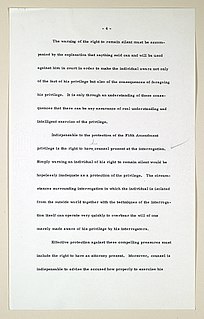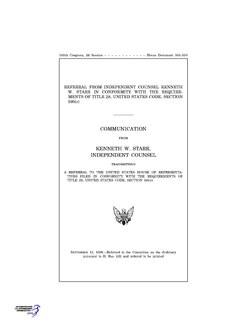
In the United States, the Miranda warning is a type of notification customarily given by police to criminal suspects in police custody advising them of their right to silence and, in effect, protection from self-incrimination; that is, their right to refuse to answer questions or provide information to law enforcement or other officials. These rights are often referred to as Miranda rights. The purpose of such notification is to preserve the admissibility of their statements made during custodial interrogation in later criminal proceedings.
Miranda v. Arizona, 384 U.S. 436 (1966), was a landmark decision of the U.S. Supreme Court in which the Court ruled that the Fifth Amendment to the U.S. Constitution restricts prosecutors from using a person's statements made in response to interrogation in police custody as evidence at their trial unless they can show that the person was informed of the right to consult with an attorney before and during questioning, and of the right against self-incrimination before police questioning, and that the defendant not only understood these rights, but voluntarily waived them.
Hearsay is testimony from a witness under oath who is reciting an out-of-court statement that is being offered to prove the truth of the matter asserted.
The right to silence is a legal principle which guarantees any individual the right to refuse to answer questions from law enforcement officers or court officials. It is a legal right recognized, explicitly or by convention, in many of the world's legal systems.

The Starr Report, officially the Referral from Independent Counsel Kenneth W. Starr in Conformity with the Requirement of Title 28, United States Code, Section 595(c), is a United States federal government report by Independent Counsel Ken Starr concerning his investigation of President Bill Clinton. Delivered to the United States Congress on September 9, 1998, the allegations in the report led to the impeachment of Bill Clinton and the five-year suspension of Clinton's law license.
Crawford v. Washington, 541 U.S. 36 (2004), is a United States Supreme Court decision that reformulated the standard for determining when the admission of hearsay statements in criminal cases is permitted under the Confrontation Clause of the Sixth Amendment. The Court held that prior testimonial statements of witnesses who have since become unavailable may not be admitted without cross-examination.
Self-incrimination is the act of exposing oneself generally, by making a statement, "to an accusation or charge of crime; to involve oneself or another [person] in a criminal prosecution or the danger thereof"..
Witness impeachment, in the law of evidence of the United States, is the process of calling into question the credibility of an individual testifying in a trial. The Federal Rules of Evidence contain the rules governing impeachment in US federal courts.
Section 13 of the Canadian Charter of Rights and Freedoms is a section of the Charter which, along with section 11 (c), specifies rights regarding self-incrimination.
In the common law, spousal privilege is a term used in the law of evidence to describe two separate privileges that apply to spouses: the spousal communications privilege and the spousal testimonial privilege.
The Confrontation Clause of the Sixth Amendment to the United States Constitution provides that "in all criminal prosecutions, the accused shall enjoy the right…to be confronted with the witnesses against him." The right only applies to criminal prosecutions, not civil cases or other proceedings. Generally, the right is to have a face-to-face confrontation with witnesses who are offering testimonial evidence against the accused in the form of cross-examination during a trial. The Fourteenth Amendment makes the right to confrontation applicable to the states and not just the federal government.

R v Darrach, [2000] 2 SCR 443, 2000 SCC 46, is a case decided by the Supreme Court of Canada on the constitutionality of the Criminal Code's "rape shield law". The Court upheld the law.
Shareef Cousin is an African-American man from New Orleans who was convicted of the first-degree murder of Michael Gerardi in 1996 and sentenced to death as a juvenile in Louisiana. At age 17, he became the youngest condemned convict to be put on death row in Louisiana, and one of the youngest in the United States.

The Fifth Amendment to the United States Constitution addresses criminal procedure and other aspects of the Constitution. It was ratified, along with nine other articles, in 1791 as part of the Bill of Rights. The Fifth Amendment applies to every level of the government, including the federal, state, and local levels, in regard to a US citizen or resident of the US. The Supreme Court furthered the protections of this amendment through the Due Process Clause of the Fourteenth Amendment.
Jencks v. United States, 353 U.S. 657 (1957), is a U.S. Supreme Court case.
Kastigar v. United States, 406 U.S. 441 (1972), was a United States Supreme Court decision that ruled on the issue of whether the government's grant of immunity from prosecution can compel a witness to testify over an assertion of the Fifth Amendment privilege against self-incrimination.
Berghuis v. Thompkins, 560 U.S. 370 (2010), is a landmark decision by the Supreme Court of the United States in which the Court considered the position of a suspect who understands their right to remain silent under Miranda v. Arizona and is aware that they have the right to remain silent, but does not explicitly invoke or waive the right.
James v. Illinois, 493 U.S. 307 (1990), was a United States Supreme Court case in which the Court forbade the admission of evidence obtained in violation of the Fourth Amendment for the use of impeaching statements made by a defense witness.
The South African law of evidence forms part of the adjectival or procedural law of that country. It is based on English common law.
Kansas v. Cheever, 571 U.S. 87 (2013), was a United States Supreme Court case in which a unanimous Court held that the Fifth Amendment does not prevent the prosecution from introducing psychiatric evidence to rebut psychiatric evidence presented by the defense.




